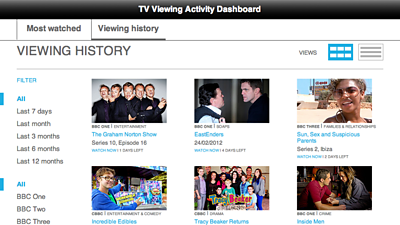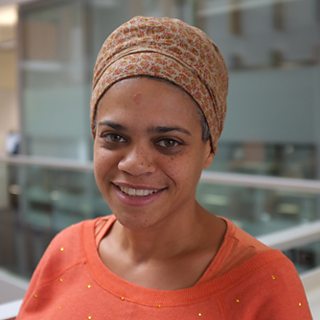This work is part of a large-scale EU-funded research project aimed at identifying innovative uses and distribution of content through IP-enabled devices. The project's research span across AR gaming, connected TVs, streaming to cinemas, user-generated content and education & culture.
Project in 2012

What we are doing
We carried out two studies to explore viewers' attitude towards privacy and data control/management with particular focus on TV viewing- live and on-demand. The outputs are in the form of low-fi & fully functional prototypes to gather explicit and implicit data, evaluation reports that contributed to formal EU deliverables and blog posts.
Why it matters
With the increase of professional content streamed over IP and consumed on a variety of devices, broadcasters and other media services providers will be capturing increasing amounts of data about the content users are consuming. As IP-enabled TVs will gradually be present in every household, users will be able to access a wider range of services that gathers usage data. This means the same concerns over privacy, current on the web, will begin to emerge on TV.
As public broadcasters it is important we inform viewers on changes in the ways TV consumed and be transparent about it in order to keep high audience's trust in the service.
It allowed to address the recent EU Data Protection Regulation while it was still in the making and investigating how we would allow users to manage, delete, export their personal data from ΒιΆΉΤΌΕΔ services, and looking into W3C tracking compliance proposal which defines a do not track user preference option.
Our Goals
One of our organisation's objectives is to offer every individual open and easy access to, and full control of, their personal data held by the ΒιΆΉΤΌΕΔ. This project aimed at informing questions around transparency by looking at :
- understanding users' awareness and attitude towards tracking activity on TV
- explore the level of trust users have on public broadcasters holding their data
- identifying and evaluate with users best formats to present back users' data on TV/other ΒιΆΉΤΌΕΔ products
- understanding what level of control , if any, users want to have over their personal data
Outcomes
From our studies it emerged our participants were mostly comfortable about their TV data being collected as long as they trust what the service provider will do with it and have a degree of control over it by offering the option of limiting that use or stop it if they wish to. Make options available even if users won't use them much.
In terms of knowledge transfer, this project has:
- informed interested stakeholders on what level of control over their data end users are likely to use based on analytics
- the Chrome extension we developed and tested with end users proved to be an interesting approach to rapid prototyping of new features on existing ΒιΆΉΤΌΕΔ products without embed them in their architecture - avoiding impact on functionality complementary and relevant to other EU partners' use cases
- impact on other EU public broadcasters: Berlin based RBB has used our study results to raise awareness within the organisation on the importance of addressing this issue in order to retain viewers' trust in the service
How it works
We first conducted a diary study over a period of two weeks where participants had to record online their TV viewing - explicit data.
Subsequently we presented back their activity data in a lab session alongside lo-fi prototypes we created showing some benefits of data gathering (progress in a programme and recommendations) in the context of a ΒιΆΉΤΌΕΔ product.
Our next study focused on users' behaviour and implicit data gathering by providing users with the ability to view and control their attention data. How would they behave? Would they use the features? Would they consider it a valuable addition? Those are some of the questions we were seeking answers to.
The study was carried out remotely for a period of 30 days and participants had to install a Chrome extension we developed that would allowed us tracking of users' interaction on the iPlayer. The analytics recorded by the system helped us evaluate what features users used the most, in what context ,which ones weren't used and the time when such features were used. Users' feedback to the automatic collection of their data, and the features provided were gathered via an online questionnaire. For analysis, the results for the questionnaire were compared with Chrome extension activity and usage data.
Project Team
Project Partners
-
A provider of production, postproduction, and distribution services to content creators and distributors.
-
An international company that designs and develops visualization solutions for a variety of selected professional markets.
-
Disney Research Zurich A research laboratory inventing new technology for Disneyβs media and entertainment businesses.
-
it represents the France Telecom-Orange Group's global innovation network.
-
A renowned research centre on Telecommunication and media topics, active in a large number of European projects in the ICT area, and contributes actively to standardisation efforts.
-
Fraunhofer IAIS (IAIS) focuses on research and development on innovative systems for data analysis and information extraction, in software and in hardware.
-
-
The public broadcaster for the federal states of Berlin and Brandenburg.
-
A world leader in mission-critical information systems for the Aerospace, Defence and Security markets.
-
A major Italian enterprise and a key European strategic ICT player, operating in fixed-line and mobile telecommunications, Internet & Media and Information Technologies.
-
The most active company in Europe in terms of European research projects in the ICT sector.
-
Part of the Technicolor Group, provides advanced software and hardware platforms such as video back-end solution, voice over IP solution, gateways, tablets and set top boxes for home content delivery.
-
It performs fundamental and applied research on Internet-based communication networks and services.
-
One of industry-leading studios that created original games for gaming platforms including Xbox 360, and PS3. Now creating new IP for Disney Interactive Studios.
-
One of the largest non-profit contract research institutes in the field of innovative software technology based on Artificial Intelligence (AI) methods.
-
A media research company offering creative concepts and project management for media research and productions.






